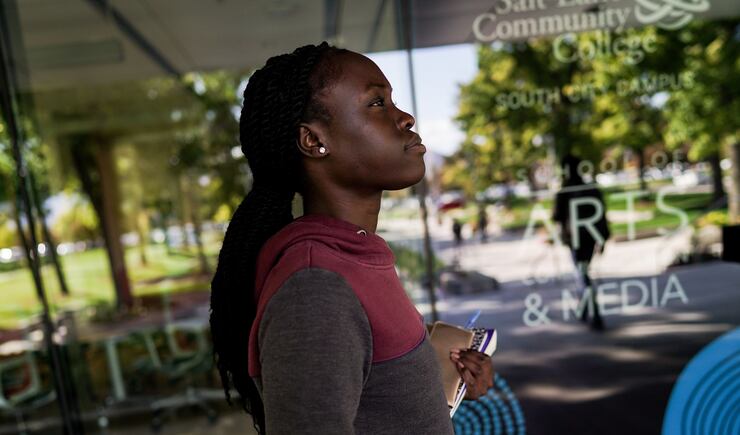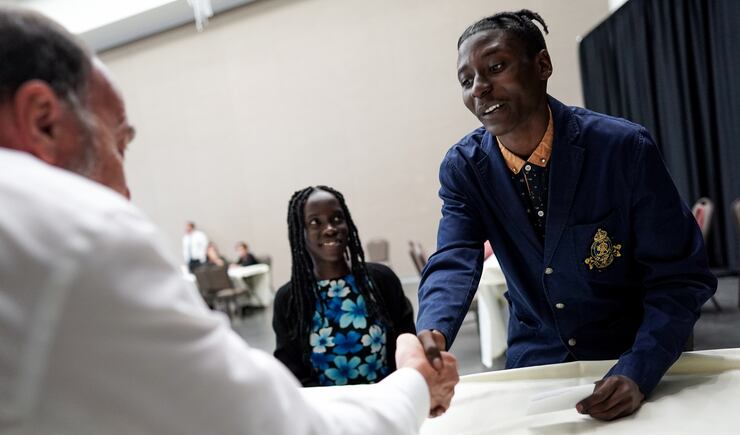WEST JORDAN — They were kids when they shoplifted, trespassed or got busted for smoking.
But Utahns with even short juvenile records have come to find the cases can follow them into adulthood. Many don’t realize it until they are denied jobs based on decisions they made before they were legal adults.
Several attorneys working in Utah’s juvenile justice system say that shouldn’t be the case. They are now are helping Utahns around the state to clear their juvenile records in a series of free clinics.

Mary Oling, who was 15 years old when she stole a tube of ChapStick from a Walmart in Salt Lake City, is among 79 people in Utah who have kick-started the process with help from Utah Juvenile Defender Attorneys and the Utah Board of Juvenile Justice.
Police have mistaken Oling twice in recent years for another person they sought to question while she was walking down the street. When she gave her name, she said, the officers instantly pulled up her history.
“Their whole attitude changes toward you. They start to get more demanding. And if you don’t have your ID on you, that makes it even more complicated,” Oling said.
A student at Salt Lake Community College, the 19-year-old Oling plans to help others in the juvenile system either as a social worker or a police officer. She was honored as an emerging leader Wednesday at an event highlighting juvenile justice efforts in Utah and attended the clinic in a West Jordan conference center with her boyfriend, Ali Ali, the same day.
Oling said she’s eager to see a judge sign off on her request for a clean slate.
“I would feel relieved and clear-minded,” Oling said.
By the end of June, organizers estimate, the sessions will help up to 150 Utahns file legal petitions seeking expungement, said Monica Diaz, the managing attorney for Utah Juvenile Defender Attorneys.
“There’s this misconception that juvenile records don’t follow you into adulthood, yet they do and they create so many barriers,” Diaz said. “We’re just fixing it one person at a time.”




The decades-old misdeeds can put professional licenses out of reach for those pursuing jobs from nursing to nails, Diaz said. Hiring managers at big companies are using increasingly sophisticated background checks.
In September, Ali, Oling’s boyfriend, said his juvenile case cost him his job as a security guard in a downtown Salt Lake City office. He had been working there for about two weeks when he got a call saying he would have to turn in his uniform and find work elsewhere. A background check revealed the 20-year-old Ali had past trouble with the law, yet he has no criminal history in adulthood, he said.
“It really made me feel like I can’t get another job, just because of a mistake I made at my juvenile stage,” he said.
When he was in high school, a friend stole less than $50 worth of clothes from a store but stashed them in Ali’s backpack, where police later found them — and marijuana. He said he completed an eight-month substance abuse treatment program and believed he’d moved on.
“Expungement should be more aggressive in terms of kids. We should be more protective of juvenile records, because kids are able to get through things and they don’t continue to have adult offenses. That’s what rehabilitation is about, right?” — Pam Vickrey, the executive director of Utah Juvenile Defender Attorneys
Ali didn’t make a disclosure on his job application, figuring the records were sealed and could only become a problem if he worked in a federal building or for a giant corporation. They had not posed a problem at his last two security jobs.
“They get in trouble as dumb kids,” said 3rd District Juvenile Judge Julie Lund, who volunteered at the Tuesday clinic. “And those mistakes follow them around through life until they get them expunged. And you don’t think about it until someone says to you, ‘Oh, you got in trouble. I have to take away your employment,’ or ‘I have to take away your job,’ or ‘I have to take away something that you want or need or hope to get.’”
On Tuesday in West Jordan, Oling and Ali conferred with defense attorneys who helped them navigate the process and prosecutors who screened them for eligibility. Lund and another judge, Elizabeth Knight, analyzed their income and expenses, determining whether they qualified for a fee waiver or would be covered by the grant.
At yet another table, the Bureau of Criminal Investigation took fingerprints and ran a background check. Many in attendance walked away with a slip of white paper with a hearing date, generally within two months.
One woman with a years-old tobacco ticket had found the citation precluded her from working as a preschool teacher.
“That’s shocking,” said Knight, the 3rd District juvenile judge who reviewed financial affidavits with Lund. She said Utahns should be able to move forward.
“I tell almost every kid when we terminate their case, ‘I expect to see you back when you’re over 18 and you can meet the requirements, because you don’t want this,’” Knight said. “So I think part of it is just trying to educate the kids we have before us that this is the final thing that you need to do.”
“I think that’s really smart,” Lund chimed in. “I don’t do that on enough cases.”
Attorneys have struggled to get the message out, said Pam Vickrey, the executive director of Utah Juvenile Defender Attorneys.
“The only thing holding me up is this record.” — Christopher Lunt, 25
“No matter how many times as a defense attorney we tell people, ‘It doesn’t go away, you need to call us,’ we will always hear people say, ‘Didn’t it just go away?’” she said.
More than a dozen states automatically seal or expunge juvenile cases, but Utah is not among them. Montana seals court and probation records on a person’s 18th birthday. In Florida, the records are automatically destroyed when a person turns 24, or at 26 for those deemed to be serious offenders.
“Expungement should be more aggressive in terms of kids,” Vickrey continued. “We should be more protective of juvenile records, because kids are able to get through things and they don’t continue to have adult offenses. That’s what rehabilitation is about, right?”
The cases that remain on the books can affect more than just jobs.
Applications for colleges, federal financial aid and housing assistance also require a person to disclose a juvenile record unless expunged. The military demands to know about even the cleared cases — though they don’t always preclude a person from serving.
The cases don’t vanish without $150 in fees, but the process is free through the clinics. A $56,000 federal grant awarded to the Utah Board of Juvenile Justice offsets the cost.
Even if a judge grants their petition, some traces remain. Courthouses, law enforcers and even school districts will toss the records under a judge’s order, though the FBI does not, Diaz said.

And not everyone is eligible for the help. Those who committed murder or have an adult felony conviction don’t qualify, and a person must be at least 18 years old.
Christopher Lunt, now 25, believes the mark on his juvenile record — a trespassing citation from age 17 — may have stalled his application for Global Entry, a U.S. government program that allows certain travelers to move faster through customs checks. A recent graduate of Southern Utah University, he was preparing Tuesday to leave for a vacation in London, and will travel to Beijing next month.
“The only thing holding me up is this record,” he said.
Another visitor, Jose, who asked to be identified only by his middle name, said he was 14 when he and a group of friends decided to smoke marijuana near a movie theater. He was ordered to 80 hours of community service and found new friends a short time later.
He compared the mistake to an embarrassing tattoo.
“You know it’s there. It kind of sucks. But it’s nice to be able to expunge it because now it’s kind of hidden,” he said. “We all make mistakes, and that those mistakes don’t define who we are.”
The next clinics are Dec. 6 at St. George’s 5th District Courthouse and April 17 at Vernal’s 8th District Court. Another in either Moab or Price is expected to follow.






